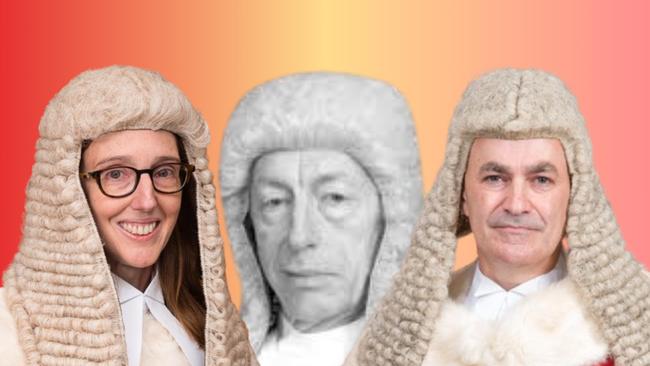NSW consent laws ‘confusing’ in Jayden Smee case, say Supreme Court judges
An 18-year-old found guilty of raping a drunk schoolgirl has had his conviction quashed, after a trio of NSW Supreme Court judges said the consent laws governing the incident were ‘confusing’.

An 18-year-old found guilty of raping a drunk schoolgirl after a game of spin the bottle has had his conviction quashed, after a trio of Supreme Court judges said the consent laws governing the incident were “confusing”.
The NSW Supreme Court on Monday threw out the conviction of Jayden Smee over the alleged 2019 assault, saying the laws at the time determining whether someone could consent to sex while drunk were “not a model of drafting” and finding a “miscarriage of justice has been established”.
It is now up to NSW chief prosecutor Sally Dowling to order a retrial if she wishes.
The judgment comes as jurisdictions around Australia undergo a reckoning when it comes to consent laws in the wake of the MeToo movement.
NSW, the ACT, Tasmania, Queensland and Victoria have reformed consent laws in recent years to adopt an affirmative model, while Western Australia, South Australia and the Northern Territory are poised to adopt new laws, with reviews under way and many believing reforms are imminent.The relevant NSW provisions in the Smee matter were repealed after the state overhauled its sexual assault justice framework, but the “confusing” laws still govern any rape that occurred between 2018 and 2022.
Smee was sentenced to three years in prison, with a one-year six-month non-parole period, over the incident on April 14, 2019.
Smee and a 16-year-old boy met up with the complainant and her female classmate about 7pm. The two girls had been drinking vodka, and continued to do so when the group came together. Smee and his friend drank only a little.
“At some stage the four of them played a game of ‘spin the bottle’, after which the group broke up into pairs,” the judgment reads. “It was not in dispute that an act of fellatio and of cunnilingus occurred between the applicant and the complainant.”
Smee told police during an interview that the complainant had told her to “put it in” – suggesting penile-vaginal intercourse – but he refused, saying “you’re too drunk”.
The complainant said she had very little recollection of the events, due to her level of intoxication. She did, however, recall that she had said “get it in” and “probably did not say ‘no’ ”.
“The complainant ended up becoming unresponsive and an ambulance was called. Expert evidence was led as to her state of intoxication,” the judgment reads.
“At the trial there were two key issues: whether the complainant had consented in the relevant legal sense, and the applicant’s state of knowledge as to her claimed lack of consent.”
Smee relied on a sole ground of appeal: that NSW District Court judge James Bennett misdirected the jury as to the issue of substantial intoxication and consent. Judges Anna Mitchelmore, Jeremy Kirk and David Davies found this ground was made out, saying the relevant provisions in the state’s Crimes Act has the potential to “create confusion”.
The judges quashed a guilty finding relating to the cunnilingus with the complainant. “Any bail application the applicant may wish to make as a consequence of this appeal will be a matter, in the first instance, for the District Court,” the judges said.
Smee’s lawyers submitted that a direction given by Judge Bennett to the jury during trial was incorrect. The direction was that “the law provides that a person does not consent to sexual intercourse if the person consented while substantially intoxicated by alcohol”.
“(Smee’s) attack focused on the use of the word ‘while’, saying that it suggests that if there is any temporal overlap between the substantial intoxication and the consent given then the law automatically renders the consent void,” the appeal judges found. “The attack has force but not quite for the reason the applicant gives. Section 61HE(8)(a) provides that ‘it may be established that a person does not consent to a sexual activity … if the person consents to the sexual activity while substantially intoxicated by alcohol or any drug’.
“The provision itself thus uses the word ‘while’. The problem is not so much with the use of that word but with the failure to take account of the significance of the statutory words ‘it may be established’.
“His Honour said that ‘the law provides that a person does not consent to sexual intercourse if the person consented while substantially intoxicated by alcohol’. That is incorrect.
“The law, correctly understood, provides that in such circumstances it may be established that the person did not consent to sexual intercourse, taking account of all the circumstances. The statement wrongly suggests that if the jury found the person consented while substantially intoxicated then they are necessarily taken not to have consented.”
In the final paragraph of the direction Judge Bennett “repeated the error” by suggesting “that if the complainant’s consent was given while she was substantially intoxicated by alcohol, then that suffices to establish that she did not freely and voluntarily agree to the sexual intercourse”.
The appeal judges agreed the Crimes Act provision relating to giving consent when intoxicated “is not a model of drafting” and said the relevant section “made somewhat confusing provision with respect to how the fact that a complainant was substantially intoxicated was relevant to whether or not they consented to sexual activity”.
“(The relevant provision) presumes that the person has consented but provides that that may be taken not to be consent,” the judges wrote.
“This would be coherent if the provision had the automatic effect of overriding any issue of free and voluntary agreement, but it does not operate in that way.”





